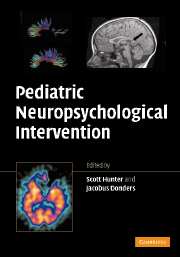Book contents
- Frontmatter
- Contents
- List of Contributors
- Section I Fundamentals of pediatric neuropsychological intervention
- Section II Managing neurocognitive impairments in children and adolescents
- Section III Medical, rehabilitative and experimental interventions
- Section IV Future directions
- 22 Reflections on present and future interventions for neurodevelopmental disorders
- Index
- Plate section
- References
22 - Reflections on present and future interventions for neurodevelopmental disorders
Published online by Cambridge University Press: 13 August 2009
- Frontmatter
- Contents
- List of Contributors
- Section I Fundamentals of pediatric neuropsychological intervention
- Section II Managing neurocognitive impairments in children and adolescents
- Section III Medical, rehabilitative and experimental interventions
- Section IV Future directions
- 22 Reflections on present and future interventions for neurodevelopmental disorders
- Index
- Plate section
- References
Summary
As many of the preceding authors have noted, there have been tremendous advances occurring in the field of pediatric neuropsychology over the past decades. Increasingly, the phenotypic expression of a variety of neurodevelopmental disorders is being described, whether these disorders result from genetic perturbations, adverse perinatal events, acquired brain insults or unknown etiologies (Baron, Fennell & Voeller, 1995; Goldstein & Reynolds, 1999). What the clinical discipline of pediatric neuropsychology additionally brings to our understanding of these disorders and their outcomes is a shared fundamental perspective about, and accompanying emphasis on, the interaction of neural development, medical treatments, environmental context, educational experiences, and family factors. This approach yields an elucidation of consistent and variable patterns of cognitive and emotional behaviors throughout the course of growth and development, which is crucial to our development of approaches for intervention and rehabilitation. Reliance upon, and promotion of, such a biopsychosocial model of development is the theme in this text; most clearly because this model holds the promise for future knowledge about what is needed to improve the functional outcome for affected children and their families.
Complementing a recent work focused on treating neurodevelopmental disabilities (Farmer, Donders & Warchausky, 2006), Hunter and Donders have edited this clinical text in three parts with the goal of helping practitioners and clinical researchers better identify and understand relevant empirically supported interventions for a number of congenital and acquired neuropsychological disorders affecting children and their families.
- Type
- Chapter
- Information
- Pediatric Neuropsychological Intervention , pp. 477 - 484Publisher: Cambridge University PressPrint publication year: 2007

